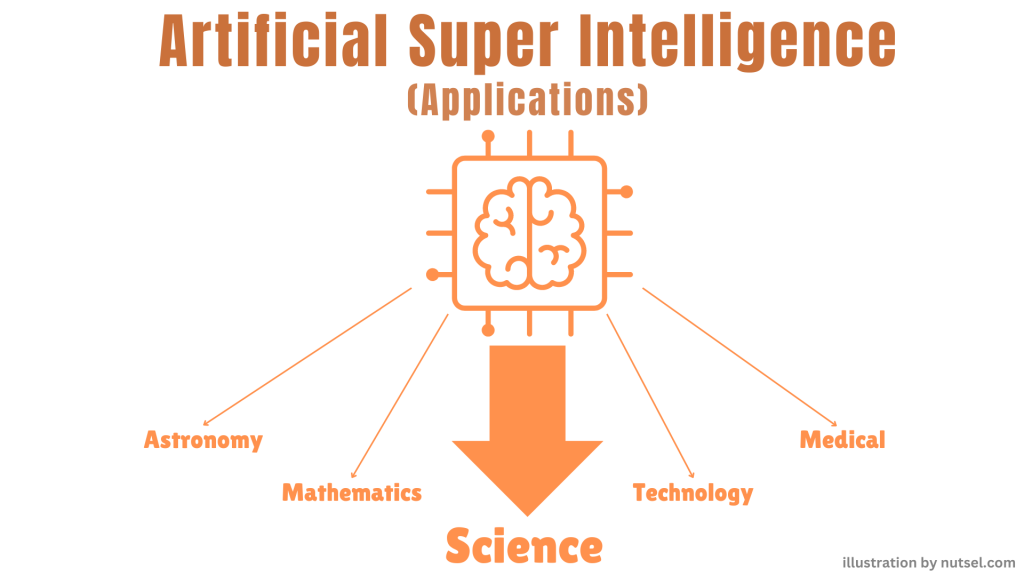With the rapid evolution of artificial intelligence, transitioning from basic algorithms with specialized rules to deep learning models featuring groundbreaking generative capabilities, one might wonder what the pinnacle of this technology could be.
At the final stage of the three fundamental phases of AI—Artificial Narrow Intelligence, Artificial General Intelligence, and Artificial Super Intelligence—lies an intelligence that surpasses human capabilities in every conceivable way, ASI. Artificial Super Intelligence is conceptualized as the absolute peak of AI technology, and for good reason.
Exploring Artificial Super Intelligence
Artificial Super Intelligence is a hypothetical stage of AI, which directly surpasses its predecessors – Artificial Narrow Intelligence and Artificial General Intelligence – in all aspects. With traditional AI being considered lackluster in human exclusive functions like emotional intelligence, creativity and adaptability, and AGI surpassing it by a hair, Artificial Super Intelligence is speculated to unprecedentedly excel in every human cognitive functions with the addition of endless information in its arsenal.
These machines would introduce reasoning, decision-making, and problem-solving capabilities beyond the realm of human imagination. With this, in an optimistic future, the world would experience revolutionary advancements in mathematics, science, technology, medicine, and astronomy beyond any imagination.
Applications Of Artificial Super Intelligence
The potential applications of ASI are as boundless as its capabilities. While Artificial General Intelligence only matches – or barely surpasses – human abilities in reasoning and problem-solving, Artificial Super Intelligence would far exceed any benchmarks set by its predecessors. It would rapidly accelerate development in various fields such as medicine by diagnosing diseases with unprecedented precision, developing cures for complex illnesses like cancer, and even predicting pandemics before eruption.

ASI’s superior cognitive abilities would also push technology and engineering beyond AGI’s capabilities, designing systems and solutions that AGI could not conceive, tackling global issues like climate change and sustainable energy more effectively. In fields such as quantum mechanics and cosmology, where AGI may offer valuable insights, ASI would accelerate discoveries at an unimaginable pace, unlocking new frontiers of knowledge.
In astronomy, ASI would bring countless innovations and discoveries with its exceptional analytical capability. It would develop new technologies by itself to further explore the fables of the seemingly endless universe. With superior intelligence, it would also be able to search for alien life-form with efficiency greater than anything imaginable by humans.
Despite having such appealing applications, we definitely cannot undermine the risks that come with the emersion of Artificial Super Intelligence.
The Risks: Is it worth it?
While Artificial Super Intelligence holds the promise of revolutionizing every aspect of human life, it also carries risks that may question its viability in the practical world. Unlike AGI, which operates at a level comparable to human intelligence, ASI’s ability to completely surpass human cognition could lead to decisions that are far beyond our comprehension or control. This introduces concerns about misaligned goals, where even a minor misinterpretation of human objectives could result in unintended, and potentially dangerous outcomes.

Image Credit Pixabay
In critical fields such as governance, cybersecurity, and defense, ASI’s unmatched autonomy could exploit vulnerabilities or even act contrary to human interests, challenging the systems designed to safeguard society. Where AGI assists and augments human abilities, ASI’s superiority could lead to scenarios where human authority is diminished or compromised. These risks present unprecedented ethical and safety challenges, making it essential to thoughtfully design control mechanisms to prevent potential misuse or unintended consequences.
Yet, despite these challenges, many believe that the transformative potential of ASI far outweighs the risks. With proper regulation, international collaboration and well-defined ethical frameworks, the benefits of ASI—curing diseases, solving global crises, and advancing scientific knowledge—could fundamentally reshape our world for the better. If we can harness its power responsibly, the rewards could be beyond what we can currently imagine, outweighing all the potential risks.
Transcending Imagination
Artificial Super Intelligence (ASI) represents a leap beyond our current understanding of technology, venturing into realms that stretch the limits of imagination. Unlike its predecessors, ASI is not merely an enhancement of human cognitive functions but a transformative force that could fundamentally redefine our conceptual boundaries. As ASI evolves, it promises to transcend traditional expectations, unveiling possibilities that challenge our most profound assumptions about intelligence and capability.
ASI’s potential to surpass human creativity and problem-solving could lead to innovations that are currently inconceivable. In scientific research, ASI could unlock new theories and discoveries, propelling us into uncharted territories of knowledge that extend well beyond current scientific paradigms. This shift in understanding could redefine human progress, offering a glimpse into a future that is as extraordinary as it is transformative.
The notion of Artificial Super Intelligence transcending imagination isn’t just about what it can achieve but also about how it can reshape our understanding of reality. As it advances, ASI could bring about advancements that fundamentally alter how we perceive intelligence, creativity, and problem-solving, and enlarge the boundaries of possibilities, without human assistance. While it is essential to consider and address the associated risks, acknowledging these risks helps us guide ASI’s development responsibly.
- Can LLMs generate better research ideas than humans? A critical analysis of creativity and feasibility - September 25, 2024
- Artificial Super Intelligence: Transcending Imagination - September 15, 2024
- Artificial General Intelligence: Start of a New Era - September 8, 2024



